6 Alternatives to Excel for Marketers
For years, Microsoft Excel has been the go-to data analysis tool for marketers worldwide, offering a familiar platform for crunching numbers, analyzing campaigns, and forecasting trends. However, as marketing becomes increasingly data-driven and complex, the limitations of Excel are more apparent, prompting marketers to seek out alternatives that can better meet their reporting and analysis needs.
We now require tools that offer real-time data integration, collaborative features, and customizable dashboards, all while being user-friendly, scalable and easily shareable. This need for more specialized and efficient tools has led to the emergence of several powerful alternatives to Excel, each designed with marketers in mind.
In this blog, we'll explore 6 alternatives to Excel for marketers, diving into options that enhance productivity, streamline data analysis, and foster collaboration between teams. Before we delve into these alternatives, let's first look at a few of the limitations of Excel, and provide some context as to why alternatives are not just beneficial but necessary for those looking to stay ahead in a competitive digital marketing environment.
Limitations of Excel for Marketers
Collaboration issues
Excel's structure, primarily designed for individual use, presents significant challenges in a collaborative and dynamic setting. When working collaboratively with Excel files amongst team members, there can often be version control issues, where changes are made in one version and not reflected in another, meaning team members may be working on outdated information without realizing it.
Limited reporting features
Excel, though powerful, has its limitations in terms of its reporting features. Creating visually compelling and interactive reports requires external tools or add-ons. This limitation becomes apparent when marketers need to present data in a visually engaging way or require dashboards that reflect current data trends. Excel’s static nature means that reports are often snapshots in time, requiring manual updates for real-time insight, which is not always feasible or efficient.
Price
While Excel is part of the Microsoft Office Suite, the cost can be a barrier, particularly for startups and small businesses. The subscription model, necessary to keep the software updated with the latest features, adds to ongoing operational costs. As businesses scale, these costs can become significant, prompting the search for more cost-effective solutions that offer similar or enhanced functionalities.
Knowledge and skillset
Effective use of Excel for data analysis and reporting necessitates a certain amount of experience and skill. This specialization can limit accessibility to a broader team, confining data analysis tasks to individuals with specific skill sets. The time and resources needed to train staff to use Excel effectively can be considerable, diverting valuable resources from other areas of the business.
Time-consuming updates
In an era where data changes by the minute, the manual process of updating Excel sheets becomes a bottleneck for marketers striving for agility and timeliness. Each update requires individual attention, whether it's inputting new data, adjusting formulas, or ensuring that changes are reflected across all relevant sheets and shared with the right people. For marketers who depend on real-time data to make quick decisions, the lag in these manual updates can lead to missed opportunities and outdated insights.
Risk of errors in data entry
Manual data entry poses a high risk potential for mistakes. From typos to misplaced decimal points, the smallest error can skew results significantly, leading to flawed analysis and misguided decisions. When multiple team members are involved in updating the same Excel file, the likelihood of inconsistencies and errors multiplies. These mistakes are not just time-consuming to identify and correct but can also undermine trust in the data's reliability among stakeholders.
Given these challenges, it's clear why marketers look for alternatives to Excel. The ideal solution would address these limitations by offering real-time collaboration capabilities, more intuitive data visualization and reporting features, and scalability at a reasonable cost, all while being user-friendly to reduce the need for extensive training. Check out these alternatives.
1. Hurree
Hurree allows you to centralize, visualize and collaborate on your data all in one powerful platform without needing to manually update any spreadsheets. Whether you’re gathering crucial insights for decision-making, providing updates to your manager, or collaborating with different teams, Hurree dashboards offer a concise and real-time overview of your most important metrics.
Pros of Hurree:
- Seamless integrations: Hurree simplifies data management by integrating with a wide variety of tools, eliminating the need to toggle between platforms when compiling reports. These integrations save considerable time and enhance efficiency in report creation.
- Effortless no-code setup: Setting up Hurree is simple, requiring no coding skills or developer assistance. This enables a swift and straightforward setup process, allowing you to dive into data analysis without delay.
- Accessible free version: Hurree offers a free version that's fully functional without the need to enter any payment details, making it accessible for marketers wanting to test its capabilities firsthand.
- Comprehensive support: Users benefit from extensive online support options, including an online chat, direct email assistance, and a wealth of resources in their online help centers.
- Enhanced collaboration tools: The platform includes features to boost team collaboration, such as scheduled snapshots, which are automatically sent out at specified intervals, fostering a collaborative work environment.
- Flexible admin levels: With different admin levels, team members can access different functionalities based on their roles, promoting efficient management and use of the platform.
- Diverse pre-built templates: A wide selection of pre-built dashboard templates is available, catering to various marketing needs. These templates allow you to quickly visualize key metrics from digital marketing to social media and paid ads, ensuring you're always on top of your game.
- Secure private dashboards: Hurree provides the option to create private dashboards for handling sensitive data, ensuring your reports maintain confidentiality.
- Customizable dashboards: Tailor each dashboard with specific metrics, time periods, and visualization types. Annotations and detailed descriptions can also be added for comprehensive insight and context.
- KPI tracking: Easily designate key performance indicators to metrics, making it simple to monitor which areas are excelling and which require attention.
- Extensive visualization library: Choose from a vast library of visualization types, including bar charts, line graphs, and more, to depict your data in the most effective and insightful manner.
- Intuitive interface: Features an intuitive, user-friendly interface that is easy to navigate, even for those with minimal experience using the tool. This ease of use ensures that marketers can quickly get up to speed and make the most of the tool's capabilities.
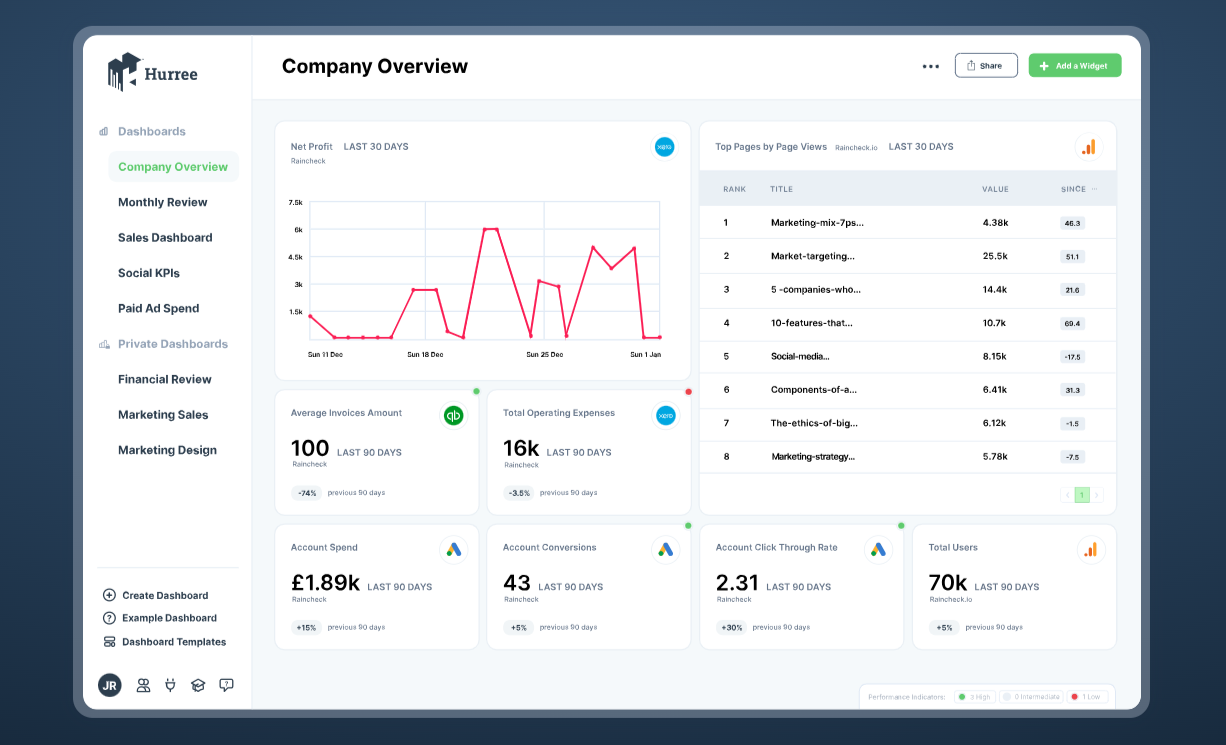
Cons of Hurree:
- Mobile experience: Although Hurree offers mobile accessibility, the experience of using complex dashboards on smaller screens may not fully match the desktop experience.
- Third-party integration limits: While Hurree integrates with many popular tools and platforms, there might be niche or legacy systems it doesn’t currently support. Organizations reliant on such systems may need to find workarounds.
2. Google Sheets
Despite looking very similar to Excel (which makes them very easily confused with each other), Google Sheets offers a versatile and collaborative alternative, making it a valuable asset for marketers seeking an efficient, accessible, and feature-rich solution for their data management needs.
Pros of Google Sheets:
- Real-time collaboration: Google Sheets enables multiple users to work on the same document simultaneously, making it an excellent tool for collaborative projects and team planning. This feature ensures that all team members can contribute, edit, and view changes in real time, fostering a dynamic work environment.
- Easy integration and compatibility: Seamlessly integrates with other Google Workspace applications and a wide range of third-party apps. This compatibility enhances its utility, allowing for smooth workflows and data synchronization across platforms.
- Accessibility and cloud-based: Being a cloud-based platform, Google Sheets is accessible from any device with internet connectivity, offering the flexibility to work from anywhere, at any time. This accessibility ensures that marketing teams can stay connected and productive regardless of their location.
- Version history: Offers comprehensive version history, enabling users to track changes, revert to previous versions, and understand the evolution of their documents. This feature is invaluable for maintaining data integrity and tracking contributions over time.
- Customizable templates: Comes equipped with a variety of customizable templates designed to meet specific marketing needs, from content calendars to budget tracking. These templates provide a solid foundation for projects, saving time and ensuring consistency.
- Extensive add-ons and scripts: The platform supports a wide array of add-ons and scripts, allowing users to extend functionality, automate tasks, and tailor the tool to their specific requirements. This flexibility makes it a powerful option for marketers looking to streamline their processes.
- Free to use: Google Sheets is freely available to users with a Google account, making it an accessible option for individuals and teams looking to manage their marketing efforts without incurring additional software costs
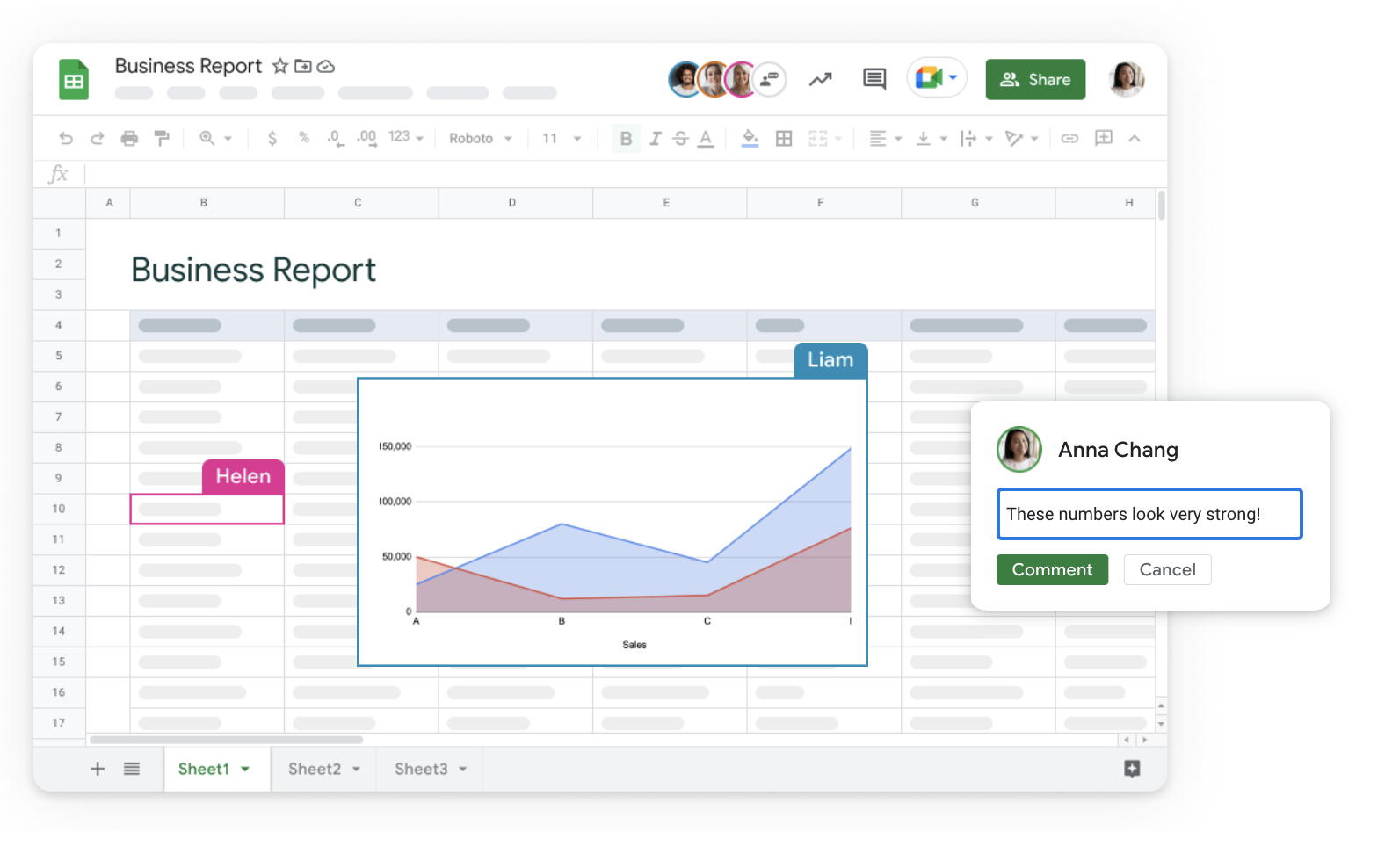
Cons of Google Sheets:
- Limited data visualization capabilities: Although Google Sheets offers data visualization tools, its capabilities are somewhat more restricted compared to Excel. Marketers looking to create complex or highly customized visual representations may find these limitations a hurdle in conveying their data's full story.
- Data privacy and security concerns: Since Google Sheets operates entirely in the cloud, all data is stored on Google's servers. This aspect might pose a challenge for businesses or individuals with stringent data privacy and security standards. The reliance on cloud storage could raise concerns about sensitive information's safety and compliance with privacy regulations.
- Performance with large datasets: Google Sheets can encounter performance issues when managing extensive datasets or executing complex spreadsheet operations. Users might experience sluggishness, affecting efficiency and potentially hindering the analysis of large volumes of marketing data.
3. Airtable
Airtable is a cloud-based platform that combines the simplicity of a spreadsheet with the power of a database. It's designed to offer a more flexible and intuitive approach to organizing, tracking, and managing information across various projects and workflows.
Pros of Airtable:
- Customization and flexibility: Airtable acts as a hybrid between a spreadsheet and a database, offering unparalleled flexibility. Marketers can customize tables to track various metrics, campaigns, and projects with unique fields for dates, dropdowns, attachments, and more.
- User-friendly interface: Despite its powerful capabilities, Airtable boasts an intuitive interface that's easy to navigate, making it accessible for marketers of all tech levels to create, manage, and analyze their data without extensive training.
- Collaboration in real-time: Airtable's cloud-based platform allows for seamless collaboration among team members. Marketers can share bases, view changes in real time, and communicate within the platform, ensuring everyone is always on the same page.
- Integration capabilities: With a wide array of integrations available through Airtable’s marketplace, marketers can connect their data with other tools and platforms they use, streamlining workflows and automating data entry.
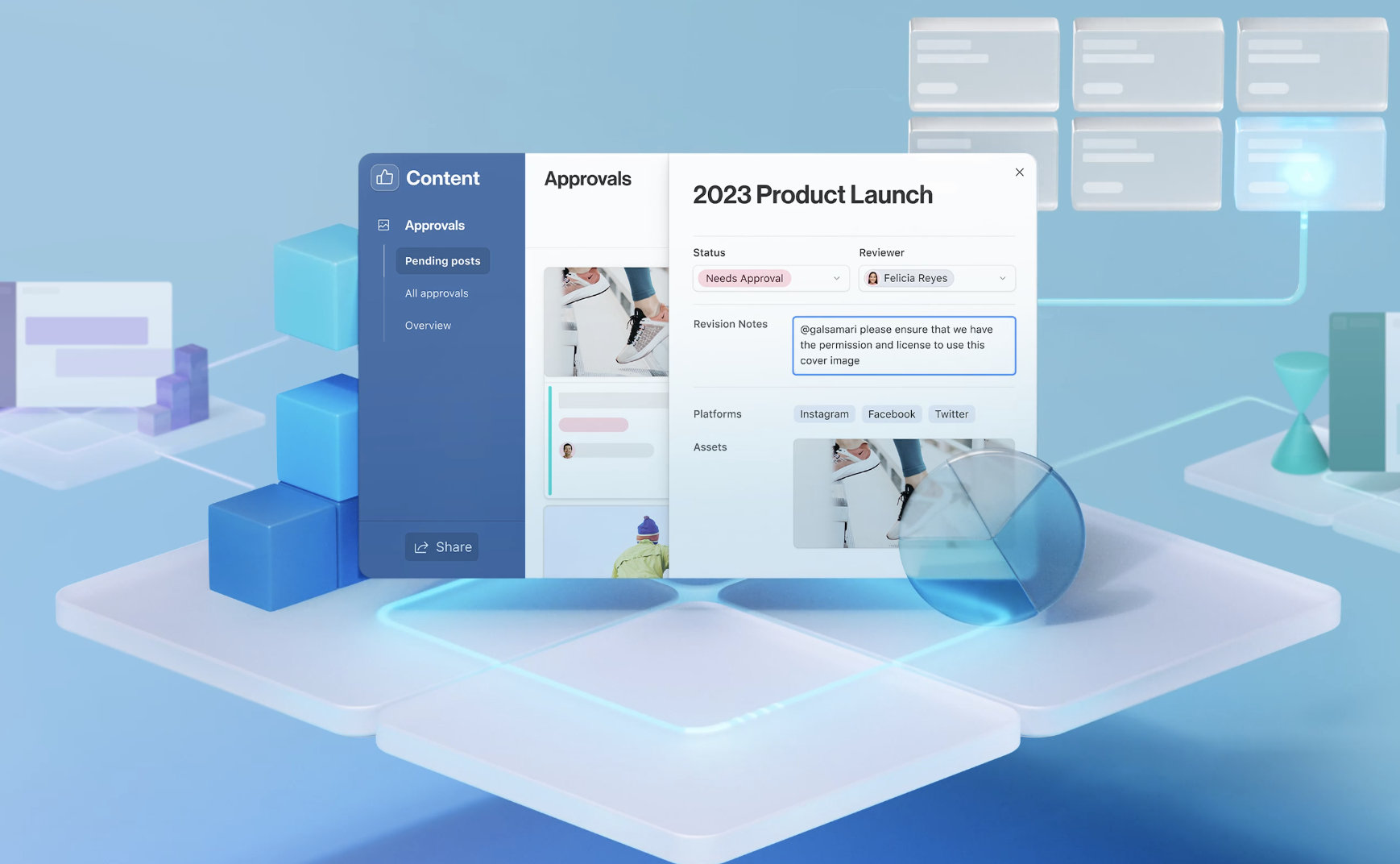
Cons of Airtable
- Learning curve: While Airtable is user-friendly, its unique blend of database and spreadsheet functionalities can require a learning period, especially for users accustomed solely to traditional spreadsheets.
- Pricing: While Airtable offers a free tier, its more advanced features, which many marketers find invaluable, are behind paid plans. For small teams or businesses, the cost can add up as needs grow.
- Performance with large datasets: Similar to other cloud-based platforms, Airtable can experience slowdowns when handling very large datasets or bases with a high level of complexity, which might affect efficiency in data-heavy marketing campaigns.
- Limited advanced analysis tools: While Airtable is excellent for data organization and visualization, it lacks some of the more sophisticated data analysis tools found in specialized analytics platforms, potentially necessitating additional tools for in-depth analysis.
4. Tableau
Tableau is a powerful data visualization tool designed to help users see and understand their data. It stands out as a great alternative to Excel for marketers, particularly for those looking to elevate their data presentation and analysis capabilities beyond traditional spreadsheets.
Pros of Tableau
- Intuitive data visualization: Easily create complex and interactive visualizations, making data analysis more accessible and understandable.
- Real-time data integration: Offers seamless integration with various data sources for real-time data analysis, ensuring up-to-date insights.
- Collaboration features: Facilitates sharing and collaboration on dashboards and reports, enhancing team communication and decision-making.
- Wide range of data connections: Connects to numerous data sources, including cloud services, databases, and spreadsheets, offering versatility in data analysis.
- Advanced analytics: Provides powerful analytical tools and capabilities for deep insights, beyond basic charting and graphing.
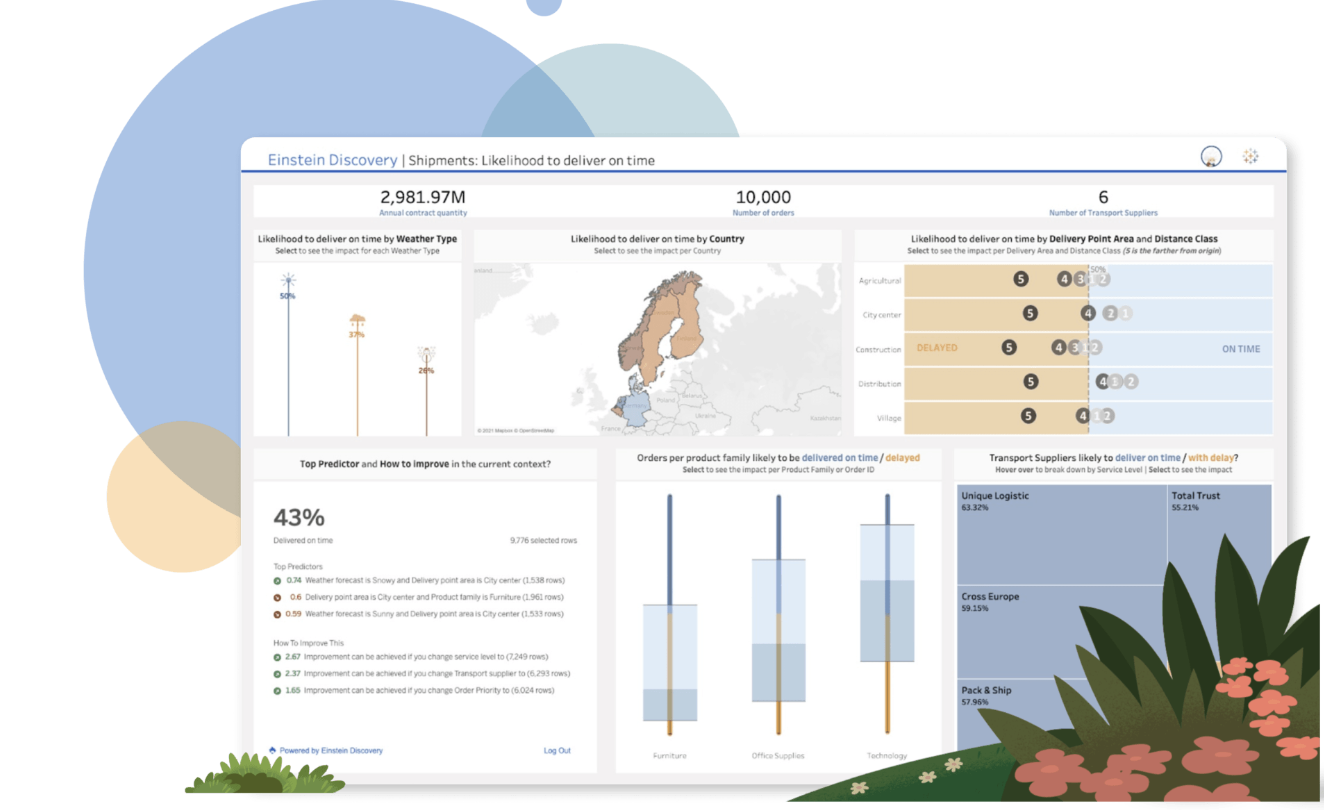
Cons of Tableau
- Cost: The pricing can be a barrier for small businesses or individual users, as Tableau's advanced features come with a premium subscription.
- Complexity for beginners: While user-friendly, the vast capabilities can be overwhelming for new users or those with basic data analysis needs. To fully utilize its advanced features, users may need to invest time in learning and training.
- Limited data manipulation: Primarily a visualization tool; it may require additional tools or software for extensive data cleaning or manipulation.
- Desktop version dependency: For the most robust features, the desktop version is necessary, which could limit accessibility compared to fully web-based alternatives.
5. Smartsheet
Smartsheet is a cloud-based platform that redefines how teams collaborate on projects and tasks, combining the best of spreadsheet-like interfaces with robust project management and collaboration features.
Pros of Smartsheet
- Real-time data synchronization: Smartsheet's ability to synchronize data in real time across all connected platforms ensures that marketing teams always have access to the most current data.
- Resource management tools: Smartsheet includes resource management features that allow marketing teams to allocate tasks, track time spent on activities, and manage workloads efficiently.
- Custom branding and formatting: Marketers can apply custom branding and formatting to their Smartsheet projects and reports, ensuring that all external-facing documents are consistent with the company's brand identity.
- Template gallery for quick start: With a rich template gallery tailored to various marketing functions, Smartsheet enables marketers to quickly start new projects without building from scratch. These templates cover areas like event planning, campaign management, content calendars, and more, providing a solid foundation that can be customized as needed.
- Advanced sharing and permissions: Smartsheet's sophisticated sharing options and permission controls ensure that sensitive marketing data is securely managed. Marketers can easily configure who has access to view, edit, or manage projects, safeguarding data integrity and compliance.
- Feedback and approval workflows: The platform simplifies the review and approval process for marketing content, designs, and other deliverables. By automating feedback loops, Smartsheet accelerates the approval workflow, reducing bottlenecks and ensuring timely project progression.
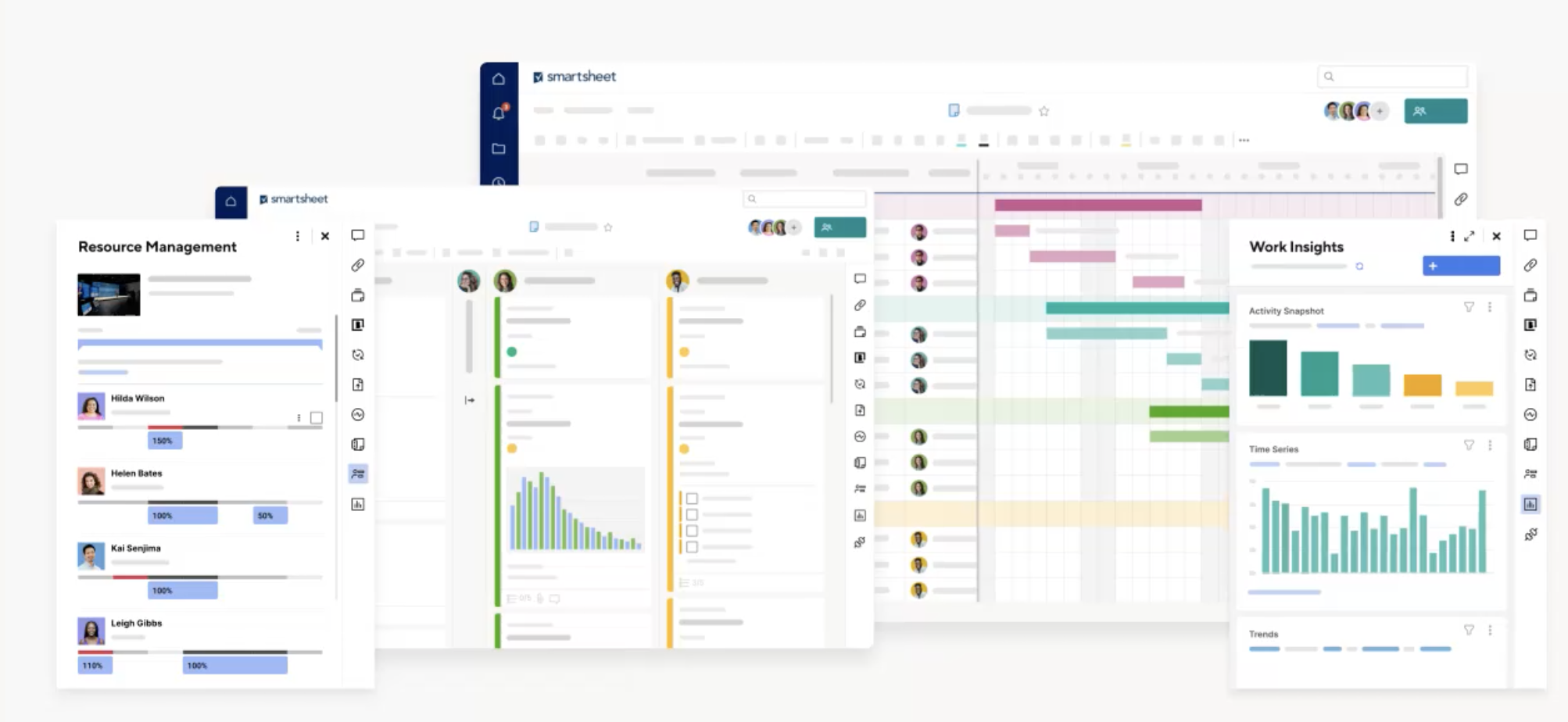
Cons of Smartsheet
- Advanced analytical features: Marketers who rely heavily on sophisticated data analysis might find Smartsheet's capabilities in this area lacking compared to specialized analytical tools or advanced spreadsheet functions found in Excel. This limitation could impact the depth of insights derived from marketing data.
- User interface overload: Smartsheet's interface, designed to accommodate a wide range of project management and collaboration features, might feel cluttered or overwhelming to users seeking a straightforward experience. The abundance of features, while beneficial for project management, may complicate simple data entry or analysis tasks.
- Collaboration vs. control: While Smartsheet excels in collaborative aspects, marketers may encounter challenges in controlling access and edits to sensitive data. The platform's permissions settings, though comprehensive, can require meticulous management to ensure data integrity and confidentiality.
- Mobile experience: Marketers on the go might find Smartsheet's mobile app experience less intuitive or feature-rich compared to its desktop counterpart. While the app offers considerable functionality, accessing the full range of Smartsheet's features and navigating complex sheets might be more cumbersome on mobile devices.
- Template limitations: Although Smartsheet provides a variety of templates, marketers with highly specific or niche requirements may find these templates less customizable than desired. Tailoring Smartsheet to fit unique marketing strategies or campaigns could necessitate additional setup time and customization.
- Notification overload: The platform's notification system, critical for project management and collaboration, can become overwhelming if not carefully configured, especially in large teams or complex projects. Marketers may need to invest time in fine-tuning notification settings to avoid an excess of alerts.
6. OpenOffice Calc
OpenOffice is a free, open-source office productivity software suite that serves as a comprehensive alternative to office software packages like Microsoft Office. Within the suite, Calc is their spreadsheet application similar to Microsoft Excel, offering robust features for data analysis, calculations, and the creation of complex charts and graphs. It presents a viable alternative for marketers and small businesses in need of basic spreadsheet and data management tools without the associated costs of commercial software.
Pros of Open Office Calc
- Open-source and free: One of the most appealing aspects of OpenOffice is that it's completely free to use.
- PDF conversion: Allows for the conversion of spreadsheets into PDF format, facilitating effortless file sharing and distribution.
- Data analysis for small data sets: Offers comprehensive data analysis capabilities, ideally suited for handling smaller sets of data. It supports a wide range of common spreadsheet functions, including data analysis, pivot tables, and graphical data representation, making it suitable for basic marketing data management tasks.
- Advanced features included: Comes equipped with advanced functionalities that cater to the needs of sophisticated data handling.
- Extensions and templates: The suite offers a range of extensions and templates, enabling users to customize their applications according to specific project needs or preferences.
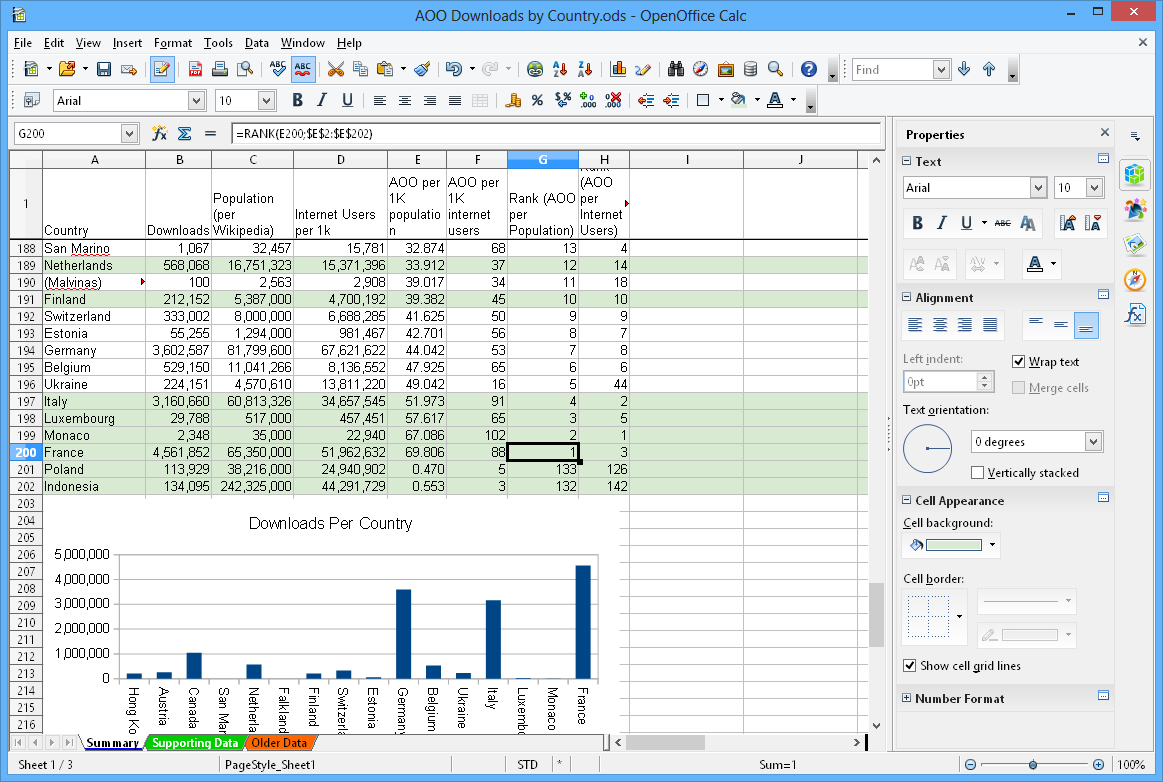
Cons of OpenOffice Calc
- Compatibility issues: You may experience difficulties with Microsoft Office files, potentially affecting seamless integration and file exchange.
- User experience: Not as intuitive or user-friendly compared to other spreadsheet software alternatives, which might steepen the learning curve for new users. Being a community-driven project, updates and new features are less frequent compared to commercial software, which may impact users looking for the latest functionalities or security enhancements.
- Support limitations: Offers limited support options, primarily relying on community forums for troubleshooting and assistance, which may not meet everyone's needs.
- Limited advanced features: While capable of basic and intermediate tasks, Calc might not offer the depth of advanced analytical tools and functionalities found in Excel or other specialized data analysis software.
- Lack of cloud functionality: Does not offer built-in cloud capabilities, limiting access to real-time collaboration and remote file access.
- Security concerns: As open-source software, it may be more vulnerable to security risks, requiring users to be more vigilant about updates and patches.
- Community-dependent support: Users must depend on community forums for technical support, which might not provide the immediate or specialized help some situations require.
As we've explored various alternatives to Excel, it's clear that each option brings its own set of features and benefits tailored to different needs and preferences. However, for marketers seeking to elevate their data analysis, collaboration, and reporting capabilities, dashboard software like Hurree offers a compelling solution. Unlike traditional spreadsheets, Hurree integrates seamlessly with your existing tools, providing real-time insights, customizable dashboards, and a user-friendly interface that requires no specialized training. This not only enhances decision-making but also streamlines your workflows, allowing you to focus on strategic initiatives rather than manual data management. Adopting a dashboard solution like Hurree can transform your approach to marketing analytics, offering a clearer, more actionable view of your performance metrics. So if you're looking to move beyond the limitations of spreadsheets and harness the full potential of your data, give Hurree a try today.
Share this
You May Also Like
These Related Stories

[Video] Benefits of Market Segmentation Analytics: The Proof is in the Data

How to Use 2024 Data to Shape a Winning Strategy for 2025



